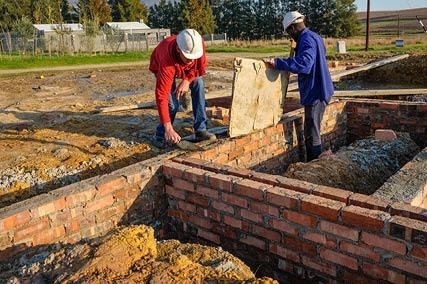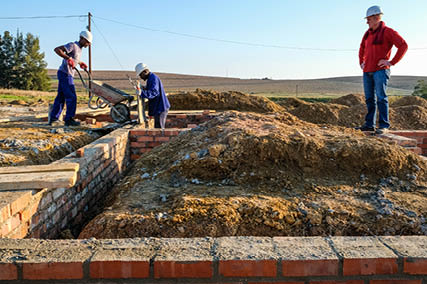The Housing Consumers Protection Measures Act 95 of 1998 was introduced into South African law to protect housing consumers and established the National Homebuilders Registration Council (NHBRC) as the regulatory body of the home building industry. The NHBRC also sets out to promote ethical and technical standards, holds home builders accountable for the homes they build, and also provides sanctions for non-compliance.
In terms of section 10(1) of the Act, no person can carry on business as a home builder, or receive payment in terms of an agreement for the sale or construction of a home, unless he is a registered home builder. The NHBRC will issue him with an NHBRC registration certificate if he is registered.
In addition, no person may build a home unless he is registered with the NHBRC. The home builder is required to enroll every home he intends to build before construction starts and an enrolment certificate is issued by him by the NHBRC.
A home builder is a person who carries on the business of a home builder. The business of a home builder means to: (a) construct or undertake to construct a home, or cause same to be constructed; (b) to construct a home to be sold or otherwise disposed of; (c) to sell or dispose of a home in terms of (a) or (b) as a principal; (d) to conduct any other activity prescribed by the minister for the purpose of this definition.
WHY IS AN NHBRC CERTIFICATE IMPORTANT?

Only houses built by registered home builders and enrolled with the council are entitled to the remedies under the Act. An NHBRC certificate is important as the NHBRC will pay out to a housing consumer where:
- There is a major structural defect in the home as a result of the home builder not complying with the NHBRC technical requirements within 5 years of the date of occupation, and the builder has notified the home builder of the defect within those 5 years;
- The home builder is in breach in that he has failed to rectify the defect;
- The home was constructed by a registered home builder, the house was enrolled with the NHBRC, and was still enrolled at the date of occupation;
- The home builder no longer exists or cannot meet his obligations;
- Where a home was enrolled on a project basis and application has been made by the MEC pursuant to an agreements in terms of section 5(4)(c).
When a home builder is registered with the NHBRC and the home is enrolled, the NHBRC will inspect the home and ensure it meets with the NHBRC technical requirements, which in turn ensure homes that are built of a high standard and good quality. It the council is of the opinion that the home builder is not complying with the Act, they can impose a penalty and may apply to court to direct the home builder to comply, stop construction or grant assistance appropriate to the circumstances.
NHBRC CERTIFICATES AND CONVEYANCING

Section 18(1) of the Act states that a financial institution cannot lend money to a person to purchase a new home from a builder if:
- The home builder is not registered with the council;
- The home has not been enrolled with the council; and
- The relevant fees have not been paid to the council.
In the light of the aforesaid, the banks will often instruct conveyancers to obtain the necessary NHBRC certificates before registering the bond, where the building on the property is less than 5 years old. In addition, section 18(2) imposes an obligation on conveyancers to obtain NHBRC certificates.
NHBRC certificates are valid for 5 years from the date of occupation. The date of occupation is the date on which the housing consumer first acquiring the home accepts the home as reflected in a document confirming such acceptance. The banks refer to this as a “Happy Letter”. If this document is not available, or if the NHBRC cannot for any reason determine the date, the date reflected on the certificate of occupancy issued by the city council will be date of occupation.
The National Home Builders Registration Council (NHBRC) is at hand to give you tips on how to go about building your new home. The NHBRC is a statutory body established to protect the consumers’ interests and regulate the home building industry.’
BEFORE YOU BUILD YOUR HOME

It is your right and responsibility to ensure that:
Your home builder is registered with the NHBRC. This can be verified through the:
- NHBRC website at www.nhbrc.org.za
- NHBRC toll-free number (0800 200 824)
- NHBRC provincial or satellite office nearest to you.
Your home builder is a reputable builder with experience and a good profile by checking:
- the number of houses enrolled;
- the number of complaints lodged against the builder; and
- References from other housing consumers who has experienced the quality of service provided by the home builder.
YOU SIGN A CONTRACT WITH THE HOME BUILDER
Your signed contract with the home builder stipulates progress payments in phases until the completion of construction.
WHAT ELSE TO DO
- You obtain approved building plans from your local municipality.
- Your home builder enrolls your home with the NHBRC at least 15 days prior to commencing with construction.
- You verify with the NHBRC if the house is enrolled prior to commencement of construction.
- You as a home owner receive an enrollment certificate confirming that the house is enrolled with NHBRC.
- Your registered home builder provides you with guidelines of the structure before construction.
- Your registered home builder confirms that the home will be built in accordance with NHBRC’s Home Builders manual or NHBRC/Agreement South Africa’s technical requirements.
NHBRC’S QUALITY ASSURANCE

If you follow these requirements and ensure that your house is enrolled, the NHBRC will:
- Conduct a minimum of four inspections on your house, to see if the construction is properly done; and
- Deal with complaints of non-compliance during construction.
- Your house will be covered by a five year warranty scheme against major structural defects, calculated from the date of occupation.
The builder will be obliged to rectify:
- Any deviation from the terms, plans and specifications of the agreement or any deficiency related to design, workmanship or material that you notify him of in writing within 3 months of occupation;
- Roof leaks you notify him/her of in writing within 1 year of occupation; and
- Major structural defects you inform him/her of in writing within 5 years of occupation.
NHBRC WARRANTY COVER
In the event that a builder is unable or unwilling to rectify reported defects, the NHBRC can rectify the defects, following the completion by the housing consumer of a complaint and conciliation process.
Maximum amounts payable
Need Information or Confused about Something ?
Ask a Question- The cover is for 5 years on major structural defects.
- The maximum amount payable is the lesser of the Enrollment Value of R500 000.
- The payable amount includes professional fees + accommodation + transport.
Did You Know : Top 15 Free Online Learning Platforms
-
Free Online Education Degrees : Coursera:
Coursera partners with universities and organizations worldwide to offer a wide range of courses. While many courses are free, a fee is often required for certification.
-
Free Online Education Degrees: edX:
Founded by MIT and Harvard, edX offers high-quality courses from top universities and institutions around the world. Certificates are available for a fee.
-
Free Online Education Degrees : Khan Academy:
Khan Academy provides free educational content in various subjects, especially mathematics and science, using instructional videos and practice exercises.
-
Free Online Education Degrees : Udacity:
Udacity focuses on tech-related courses and nanodegree programs, offering free content as well as more in-depth paid programs.
-
Free Online Education Degrees : MIT OpenCourseWare (OCW):
MIT OCW provides a vast array of MIT's course content for free, covering a wide range of disciplines.
-
Free Online Education Degrees : Harvard Extension School:
Harvard Extension School offers a selection of free online courses. While some courses are free, others may require payment for a certificate.
-
Free Online Education Degrees: Stanford Online:
Stanford Online offers a variety of free courses in different disciplines, including computer science, engineering, and business.
-
Best Free Online Courses : Carnegie Mellon Open Learning Initiative (OLI):
OLI offers free online courses and resources designed to improve learning outcomes through research-based methodologies.
-
Best Free Online Courses : FutureLearn:
FutureLearn partners with universities and institutions to offer a diverse range of free online courses. Certificates are available for a fee.
-
Best Free Online Courses: Alison:
Alison offers a wide range of free online courses, including diploma and certificate programs, covering various subjects.
-
Best Free Online Courses: Open Yale Courses:
Yale University provides free access to a selection of introductory courses through Open Yale Courses.
-
Best Free Online Courses : UC Berkeley Online:
UC Berkeley offers free online courses on a variety of subjects, ranging from computer science to humanities.
-
Best Free Online Courses : Google Digital Garage:
Google Digital Garage provides free courses on digital skills, including online marketing, data analysis, and more.
-
Best Free Online Courses : Codecademy:
Codecademy offers free coding courses, interactive exercises, and coding projects to help individuals learn programming languages.
-
Best Free Online Courses : LinkedIn Learning (formerly Lynda.com):
LinkedIn Learning provides a variety of video courses on professional development, technology, and creative skills. It offers a free trial period.